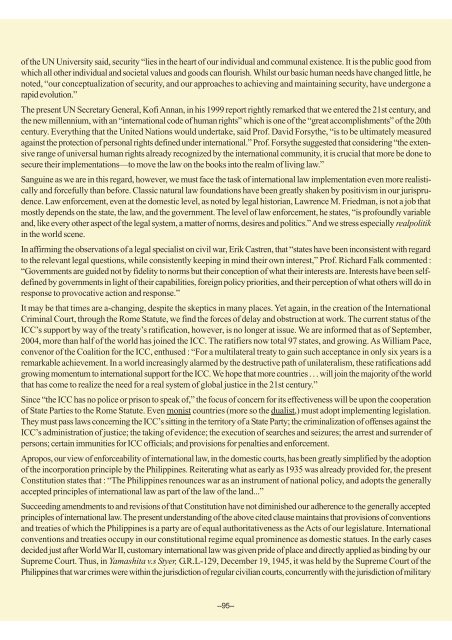Download the Speeches of all Hon'ble Chief Justices & Judges in ...
Download the Speeches of all Hon'ble Chief Justices & Judges in ...
Download the Speeches of all Hon'ble Chief Justices & Judges in ...
You also want an ePaper? Increase the reach of your titles
YUMPU automatically turns print PDFs into web optimized ePapers that Google loves.
<strong>of</strong> <strong>the</strong> UN University said, security “lies <strong>in</strong> <strong>the</strong> heart <strong>of</strong> our <strong>in</strong>dividual and communal existence. It is <strong>the</strong> public good fromwhich <strong>all</strong> o<strong>the</strong>r <strong>in</strong>dividual and societal values and goods can flourish. Whilst our basic human needs have changed little, henoted, “our conceptualization <strong>of</strong> security, and our approaches to achiev<strong>in</strong>g and ma<strong>in</strong>ta<strong>in</strong><strong>in</strong>g security, have undergone arapid evolution.”The present UN Secretary General, K<strong>of</strong>i Annan, <strong>in</strong> his 1999 report rightly remarked that we entered <strong>the</strong> 21st century, and<strong>the</strong> new millennium, with an “<strong>in</strong>ternational code <strong>of</strong> human rights” which is one <strong>of</strong> <strong>the</strong> “great accomplishments” <strong>of</strong> <strong>the</strong> 20thcentury. Everyth<strong>in</strong>g that <strong>the</strong> United Nations would undertake, said Pr<strong>of</strong>. David Forsy<strong>the</strong>, “is to be ultimately measuredaga<strong>in</strong>st <strong>the</strong> protection <strong>of</strong> personal rights def<strong>in</strong>ed under <strong>in</strong>ternational.” Pr<strong>of</strong>. Forsy<strong>the</strong> suggested that consider<strong>in</strong>g “<strong>the</strong> extensiverange <strong>of</strong> universal human rights already recognized by <strong>the</strong> <strong>in</strong>ternational community, it is crucial that more be done tosecure <strong>the</strong>ir implementations—to move <strong>the</strong> law on <strong>the</strong> books <strong>in</strong>to <strong>the</strong> realm <strong>of</strong> liv<strong>in</strong>g law.”Sangu<strong>in</strong>e as we are <strong>in</strong> this regard, however, we must face <strong>the</strong> task <strong>of</strong> <strong>in</strong>ternational law implementation even more realistic<strong>all</strong>yand forcefully than before. Classic natural law foundations have been greatly shaken by positivism <strong>in</strong> our jurisprudence.Law enforcement, even at <strong>the</strong> domestic level, as noted by legal historian, Lawrence M. Friedman, is not a job thatmostly depends on <strong>the</strong> state, <strong>the</strong> law, and <strong>the</strong> government. The level <strong>of</strong> law enforcement, he states, “is pr<strong>of</strong>oundly variableand, like every o<strong>the</strong>r aspect <strong>of</strong> <strong>the</strong> legal system, a matter <strong>of</strong> norms, desires and politics.” And we stress especi<strong>all</strong>y realpolitik<strong>in</strong> <strong>the</strong> world scene.In affirm<strong>in</strong>g <strong>the</strong> observations <strong>of</strong> a legal specialist on civil war, Erik Castren, that “states have been <strong>in</strong>consistent with regardto <strong>the</strong> relevant legal questions, while consistently keep<strong>in</strong>g <strong>in</strong> m<strong>in</strong>d <strong>the</strong>ir own <strong>in</strong>terest,” Pr<strong>of</strong>. Richard Falk commented :“Governments are guided not by fidelity to norms but <strong>the</strong>ir conception <strong>of</strong> what <strong>the</strong>ir <strong>in</strong>terests are. Interests have been selfdef<strong>in</strong>edby governments <strong>in</strong> light <strong>of</strong> <strong>the</strong>ir capabilities, foreign policy priorities, and <strong>the</strong>ir perception <strong>of</strong> what o<strong>the</strong>rs will do <strong>in</strong>response to provocative action and response.”It may be that times are a-chang<strong>in</strong>g, despite <strong>the</strong> skeptics <strong>in</strong> many places. Yet aga<strong>in</strong>, <strong>in</strong> <strong>the</strong> creation <strong>of</strong> <strong>the</strong> InternationalCrim<strong>in</strong>al Court, through <strong>the</strong> Rome Statute, we f<strong>in</strong>d <strong>the</strong> forces <strong>of</strong> delay and obstruction at work. The current status <strong>of</strong> <strong>the</strong>ICC’s support by way <strong>of</strong> <strong>the</strong> treaty’s ratification, however, is no longer at issue. We are <strong>in</strong>formed that as <strong>of</strong> September,2004, more than half <strong>of</strong> <strong>the</strong> world has jo<strong>in</strong>ed <strong>the</strong> ICC. The ratifiers now total 97 states, and grow<strong>in</strong>g. As William Pace,convenor <strong>of</strong> <strong>the</strong> Coalition for <strong>the</strong> ICC, enthused : “For a multilateral treaty to ga<strong>in</strong> such acceptance <strong>in</strong> only six years is aremarkable achievement. In a world <strong>in</strong>creas<strong>in</strong>gly alarmed by <strong>the</strong> destructive path <strong>of</strong> unilateralism, <strong>the</strong>se ratifications addgrow<strong>in</strong>g momentum to <strong>in</strong>ternational support for <strong>the</strong> ICC. We hope that more countries . . . will jo<strong>in</strong> <strong>the</strong> majority <strong>of</strong> <strong>the</strong> worldthat has come to realize <strong>the</strong> need for a real system <strong>of</strong> global justice <strong>in</strong> <strong>the</strong> 21st century.”S<strong>in</strong>ce “<strong>the</strong> ICC has no police or prison to speak <strong>of</strong>,” <strong>the</strong> focus <strong>of</strong> concern for its effectiveness will be upon <strong>the</strong> cooperation<strong>of</strong> State Parties to <strong>the</strong> Rome Statute. Even monist countries (more so <strong>the</strong> dualist,) must adopt implement<strong>in</strong>g legislation.They must pass laws concern<strong>in</strong>g <strong>the</strong> ICC’s sitt<strong>in</strong>g <strong>in</strong> <strong>the</strong> territory <strong>of</strong> a State Party; <strong>the</strong> crim<strong>in</strong>alization <strong>of</strong> <strong>of</strong>fenses aga<strong>in</strong>st <strong>the</strong>ICC’s adm<strong>in</strong>istration <strong>of</strong> justice; <strong>the</strong> tak<strong>in</strong>g <strong>of</strong> evidence; <strong>the</strong> execution <strong>of</strong> searches and seizures; <strong>the</strong> arrest and surrender <strong>of</strong>persons; certa<strong>in</strong> immunities for ICC <strong>of</strong>ficials; and provisions for penalties and enforcement.Apropos, our view <strong>of</strong> enforceability <strong>of</strong> <strong>in</strong>ternational law, <strong>in</strong> <strong>the</strong> domestic courts, has been greatly simplified by <strong>the</strong> adoption<strong>of</strong> <strong>the</strong> <strong>in</strong>corporation pr<strong>in</strong>ciple by <strong>the</strong> Philipp<strong>in</strong>es. Reiterat<strong>in</strong>g what as early as 1935 was already provided for, <strong>the</strong> presentConstitution states that : “The Philipp<strong>in</strong>es renounces war as an <strong>in</strong>strument <strong>of</strong> national policy, and adopts <strong>the</strong> gener<strong>all</strong>yaccepted pr<strong>in</strong>ciples <strong>of</strong> <strong>in</strong>ternational law as part <strong>of</strong> <strong>the</strong> law <strong>of</strong> <strong>the</strong> land...”Succeed<strong>in</strong>g amendments to and revisions <strong>of</strong> that Constitution have not dim<strong>in</strong>ished our adherence to <strong>the</strong> gener<strong>all</strong>y acceptedpr<strong>in</strong>ciples <strong>of</strong> <strong>in</strong>ternational law. The present understand<strong>in</strong>g <strong>of</strong> <strong>the</strong> above cited clause ma<strong>in</strong>ta<strong>in</strong>s that provisions <strong>of</strong> conventionsand treaties <strong>of</strong> which <strong>the</strong> Philipp<strong>in</strong>es is a party are <strong>of</strong> equal authoritativeness as <strong>the</strong> Acts <strong>of</strong> our legislature. Internationalconventions and treaties occupy <strong>in</strong> our constitutional regime equal prom<strong>in</strong>ence as domestic statues. In <strong>the</strong> early casesdecided just after World War II, customary <strong>in</strong>ternational law was given pride <strong>of</strong> place and directly applied as b<strong>in</strong>d<strong>in</strong>g by ourSupreme Court. Thus, <strong>in</strong> Yamashita v.s Styer, G.R.L-129, December 19, 1945, it was held by <strong>the</strong> Supreme Court <strong>of</strong> <strong>the</strong>Philipp<strong>in</strong>es that war crimes were with<strong>in</strong> <strong>the</strong> jurisdiction <strong>of</strong> regular civilian courts, concurrently with <strong>the</strong> jurisdiction <strong>of</strong> military--95--
















